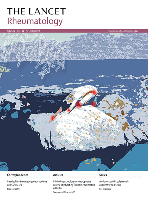
CLINICAL AND EXPERIMENTAL RHEUMATOLOGY
Scope & Guideline
Connecting research and clinical excellence.
Introduction
Aims and Scopes
- Rheumatic Disease Mechanisms:
The journal emphasizes the exploration of underlying mechanisms of rheumatic diseases, including immune responses, inflammatory pathways, and genetic predispositions, to enhance understanding and treatment strategies. - Clinical Trials and Therapeutics:
A significant focus is placed on clinical trials for new therapeutics, including biologics and small molecules, aimed at improving patient outcomes in various rheumatic conditions. - Patient-Centered Care:
Research related to patient-reported outcomes, quality of life, and the psychosocial aspects of living with rheumatic diseases is highlighted, underscoring the importance of holistic care. - Emerging Technologies in Rheumatology:
The journal encourages studies that utilize advanced technologies such as imaging techniques, biomarkers, and machine learning to improve diagnosis and management of rheumatic diseases. - Interdisciplinary Approaches:
The scope includes interdisciplinary research that integrates insights from immunology, genetics, and epidemiology to inform clinical practices and public health policies.
Trending and Emerging
- Personalized Medicine:
There is a growing emphasis on personalized treatment strategies in rheumatology, driven by genetic and biomarker research that aims to tailor therapies to individual patient profiles. - Mental Health and Chronic Pain:
Research exploring the intersection of mental health and chronic pain conditions, particularly in fibromyalgia and other rheumatic diseases, is increasingly prominent, highlighting the need for comprehensive care. - Impact of COVID-19:
The ongoing effects of the COVID-19 pandemic on rheumatic disease patients, including vaccine responses and disease management challenges, have led to a surge in related research. - Telemedicine and Remote Patient Monitoring:
The incorporation of telemedicine and digital health solutions in rheumatology has emerged as a key focus area, reflecting changes in patient care delivery models during and after the pandemic. - Novel Biomarkers and Imaging Techniques:
There is a trend towards the identification and validation of novel biomarkers and advanced imaging techniques to enhance diagnostic accuracy and monitor disease progression.
Declining or Waning
- Traditional Pharmacological Treatments:
There appears to be a waning interest in traditional pharmacological approaches, such as corticosteroids and older DMARDs, as newer biologics and targeted therapies gain prominence in clinical research. - Epidemiological Studies:
While epidemiology remains important, the volume of purely descriptive epidemiological studies has decreased, possibly due to a shift towards more mechanistic or intervention-focused research. - Basic Science Studies:
There has been a noticeable reduction in purely basic science studies that do not directly translate to clinical applications, as the journal increasingly prioritizes translational research.
Similar Journals

Archives of Rheumatology
Fostering collaboration and discovery in rheumatology.Archives of Rheumatology is a premier peer-reviewed journal dedicated to advancing the field of rheumatology through the dissemination of high-quality research, reviews, and case studies. Published by the Turkish League Against Rheumatism, this open-access journal provides a platform for researchers, clinicians, and students to share insightful findings and innovative approaches in the diagnosis and management of rheumatologic diseases. With the goal of promoting knowledge exchange on a global scale, the journal welcomes submissions that enhance understanding and foster advancements in the clinical and biological aspects of rheumatic conditions. Each publication contributes significantly to the growing body of literature in this vital field of medicine, making Archives of Rheumatology an essential resource for both established and emerging researchers looking to stay abreast of the latest developments and clinical practices.

Gastrointestinal Disorders
Connecting Researchers to Revolutionize Gastrointestinal CareGastrointestinal Disorders is a prominent open-access journal published by MDPI, based in Switzerland, that focuses on the latest research and innovations in the fields of gastroenterology, hepatology, and immunology. Since its inception in 2019, the journal has provided a vital platform for researchers and professionals to disseminate their findings, engaging with a global audience keen on advancing knowledge in gastrointestinal health. With a dedicated commitment to high-quality, peer-reviewed articles, Gastrointestinal Disorders has gained recognition in 2023, achieving Q3 status in gastroenterology and notable rankings in several other categories, including a respectable position in the quartiles for hepatology, immunology, and oncology. Despite its recent establishment, the journal has quickly become a valuable resource, facilitating open access to critical insights in the study of gastrointestinal diseases and their management, ensuring that emerging research is readily available to inform clinical practice and educate future professionals.

Reumatologia Clinica
Exploring breakthroughs in clinical rheumatology.Reumatologia Clinica is a distinguished journal dedicated to the field of Rheumatology, published by Elsevier España SLU. With its ISSN of 1699-258X and E-ISSN 1885-1398, the journal aims to disseminate pivotal research findings and clinical studies from 2005 to 2024, spotlighting advancements in the understanding and treatment of rheumatic diseases. Based in Barcelona, Spain, it plays a vital role in the academic community, ranking in the Q3 category for Rheumatology as of 2023, with a Scopus ranking of #44 out of 73, placing it in the 40th percentile. Although it operates under a traditional access model, the journal is committed to academic excellence, providing researchers, healthcare professionals, and students with invaluable insights that drive the field forward. Reumatologia Clinica serves as an essential resource for those looking to deepen their knowledge and contribute to the evolving landscape of rheumatologic research.

ALIMENTARY PHARMACOLOGY & THERAPEUTICS
Fostering Scientific Dialogue for Digestive Disease SolutionsALIMENTARY PHARMACOLOGY & THERAPEUTICS, published by Wiley, is a premier scholarly journal in the fields of gastroenterology, hepatology, and pharmacology. With an impressive impact factor and ranking in the top quartile (Q1) of its classifications, the journal is recognized for its rigorous peer-reviewed research and comprehensive reviews, aiming to advance the understanding of therapeutic interventions in gastrointestinal and liver diseases. Since its inception in 1987, it has become an essential resource for researchers, healthcare professionals, and students alike, fostering scientific dialogue and innovation. With a Scopus rank placing it in the 97th percentile for pharmacology and 96th for gastroenterology, it is dedicated to publishing the most significant and impactful findings in the field. ALIMENTARY PHARMACOLOGY & THERAPEUTICS thus plays a vital role in shaping the future of medical treatments and interventions in gastrointestinal health.

SCANDINAVIAN JOURNAL OF RHEUMATOLOGY
Fostering Insights for Enhanced Patient OutcomesThe Scandinavian Journal of Rheumatology, published by Taylor & Francis Ltd, is a prestigious peer-reviewed journal dedicated to advancing research in the fields of rheumatology, immunology, and related disciplines. With an ISSN of 0300-9742 and an E-ISSN of 1502-7732, this journal has established itself as a vital platform for disseminating significant findings and innovative approaches in the management of rheumatic diseases since its inception in 1959. As a recognized scholarly outlet, it currently resides within the Q2 category for Medicine (miscellaneous) and ranks #39 out of 73 in Rheumatology according to the 2023 Scopus assessments. This reflects the journal's commitment to high-quality research and its relevance in the scientific community. Although it does not provide Open Access options, the journal's rigorous selection process ensures that only the most impactful research reaches its audience, making it a crucial resource for researchers, clinicians, and students engaged in the exploration of rheumatological and immunological challenges. The journal's broad scope encompasses ongoing studies, clinical trials, and reviews that aim to enhance understanding and treatment of rheumatic conditions, promoting collaboration and knowledge-sharing among professionals in the field.

Lancet Rheumatology
Unveiling the latest breakthroughs in rheumatological research.The Lancet Rheumatology, published by Elsevier, is a premier academic journal dedicated to advancing the understanding of rheumatology and immunological diseases. Launched in 2019, this esteemed publication has quickly become a leading source of research, achieving an impressive Q1 ranking in both the fields of Rheumatology and Immunology as of 2023. With Scopus rankings placing it at #2 out of 73 in Medicine - Rheumatology and #6 out of 233 in Medicine - Immunology and Allergy, the journal serves as an essential platform for disseminating high-quality, peer-reviewed articles that address the latest findings and clinical practices in these domains. The journal, accessible in print and online, is committed to fostering knowledge and collaboration among researchers, healthcare professionals, and students alike, making it an invaluable resource for those seeking to deepen their expertise in rheumatology and its interrelated fields.

Current Rheumatology Reviews
Shaping the future of rheumatology through rigorous reviews.Current Rheumatology Reviews is an esteemed journal dedicated to publishing comprehensive reviews on advancements in the field of rheumatology. Established by Bentham Science Publishers, this journal has become a vital resource for researchers, clinicians, and students seeking to stay abreast of the latest developments and therapeutic strategies from 2006 to 2024. Located in the United Arab Emirates, it caters to a global audience, delivering insights that have been pivotal in shaping clinical practices. With an impact factor reflective of its Q3 status in Rheumatology by 2023, the journal ranks #46 out of 73 in the Scopus database, positioning it in the 37th percentile in the discipline. Although it operates without open access, its high-quality content ensures that each article undergoes rigorous peer review, making the Current Rheumatology Reviews a trusted platform for disseminating critical research findings and reviews that drive forward the understanding and treatment of rheumatic diseases.

Rheumatology Advances in Practice
Bridging research and practice for better patient outcomes.Rheumatology Advances in Practice, published by Oxford University Press, is a vital open-access journal dedicated to advancing research and education in the field of rheumatology. With an E-ISSN of 2514-1775 and an impressive open access model established since 2017, this journal facilitates the dissemination of cutting-edge knowledge and innovative practices to a global audience. It has garnered recognition within the academic community, holding a Q3 classification in Rheumatology for 2023, which reflects its contribution to the evolving landscape of rheumatological research. The journal aims to present high-quality, peer-reviewed articles that explore the latest findings, advancements, and clinical applications in rheumatology, making it an essential resource for researchers, healthcare professionals, and students alike. By bridging the gap between research and practice, Rheumatology Advances in Practice plays a significant role in improving the care of patients with rheumatological conditions, promoting evidence-based approaches to clinical challenges.

RMD Open
Connecting global minds in Immunology and Allergy.RMD Open, published by the BMJ Publishing Group, is a leading open-access journal that has made significant contributions to the fields of Immunology, Immunology and Allergy, and Rheumatology since its inception in 2015. With an impressive Q1 ranking in these categories for 2023, the journal has established itself as an essential platform for the dissemination of high-quality research, case studies, and reviews that advance understanding and treatment strategies in these critical areas of health. As an open-access publication, RMD Open ensures that its content is freely accessible to a global audience, promoting collaboration and knowledge sharing among researchers, clinicians, and students. Based in the United Kingdom at the British Medical Association House, RMD Open is not only dedicated to improving patient care but also to fostering innovative research and discussions in the rapidly evolving landscape of rheumatic diseases.

RHEUMATOLOGY INTERNATIONAL
Innovating clinical approaches for better patient care.Rheumatology International, published by Springer Heidelberg, is a prestigious journal that focuses on innovative research in the field of rheumatology and immunology. Established in 1981, this peer-reviewed journal has contributed significantly to advancing our understanding of autoimmune disorders, clinical approaches, and therapeutic interventions. It holds a commendable Q2 ranking in the categories of Immunology, Immunology and Allergy, and Rheumatology as of 2023, showcasing its influence and importance within these disciplines. With a robust Scopus ranking—positioned 14 out of 73 in Medicine Rheumatology—it caters to a diverse audience of researchers, clinicians, and students committed to improving patient care and treatment modalities. Although it does not currently offer open access options, the journal remains a vital resource for insights on contemporary challenges and breakthroughs in rheumatological research, published from its base in Heidelberg, Germany.